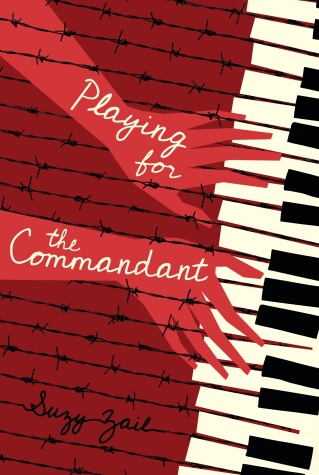
readingwithwrin
Written on Jan 19, 2016
"It didn't make any sense. They couldn't be kicking us out of the ghetto. It was their idea to create it, their idea to crum us inside its claustrophobic walls. We'd done everything they'd asked of us. We'd painted yellow stars on our apartment buildings, we'd obeyed curfew, we didn't take buses or use the telephone. I wasn't a troublemaker. I was a straight-A student. I'd won a scholarship to the Budapest Conservatorium of Music. I was smart. I was talented."
First I would like to say that I am very happy they changed the title of this book. (It was called The wrong boy.)
Secondly, while there was a romance in this story you don't see much of it until the end and it happened so gradually that it wasn't that surprising when it happened.
Now onto the review....
Hannah Mendel wants to be just like her idol Clara Schumann, she tries to replicate everything Clara has done in her music life even if it is just recreating it in the town that she lives in. Hannah is very talented, so talented that even though it will get her teacher arrested she still comes and teachers her piano and insists that she keep playing no matter what. Hannah is extremely dedicated and is sure that once the war is over that she will be able to be just like Clara. That is until the family gets forced out of their home and sent to the train yard where they live, for several days. That's when Hannah starts realizing that things aren't going to get better, and that she might not be able to do what, her idol has done.
Hannah is extremely naive mostly due to her family protecting her so much and just making sure that she stays focused on her piano playing.
Once her family gets to Auschwitz and they are separated from her father, and Hannah quickly realizes that this isn't going to be like what they have heard from others. When she sees a familiar face in the crowd she goes to them and they help her get an opportunity to play for the Commandant in his home.
Hannah gets the position and then lives in fear every day that she will do something to make him made or upset him and he will kill her. The perk to working at the Commandant's house though is that if he isn't home she can practice as much as she wants and as long as she isn't caught she can take enough food for herself and her family.
Now for the romance. When Hannah first sees Karl she is afraid of him. But slowly as she gets to see how he acts and shows compassion for the other Jews working in the house she knows that he isn't like his father. Slowly Karl starts to "befriend" Hannah, he saves her several times from his father and makes sure that she always has something to eat when he can. Karl is nothing like his father, but yet he is also somewhat afraid of his father I think and just wants his father to show some interest in him.
Throughout the book you get to see that Karl is very lonely and he wants life to go back to how it was before the war that is something that they have in common.
One thing that surprised me about Hannah and Karl was that she never hated him or blamed him for his father's actions and what his father was doing to her family and the other prisoners. (Mostly because up until the end she didn't truly realize how different things were from what she thought.)
"When they look at you, they don't see a girl who hands her homework in on time. They don't care that you wake at six every morning to practice piano. They don't see a concert pianist when they see you- They see a Jew."
See more reviews like this on my blog.
